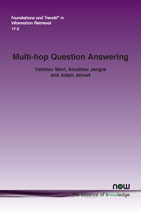Multi-hop Question Answering
By Vaibhav Mavi, New York University, USA, vaibhavg152@gmail.com | Anubhav Jangra, Indian Institute of Technology Patna, India, anubhav0603@gmail.com | Adam Jatowt, University of Innsbruck, Austria, jatowt@acm.org
Abstract
The task of Question Answering (QA) has attracted significant research interest for a long time. Its relevance to language understanding and knowledge retrieval tasks, along with the simple setting, makes the task of QA crucial for strong AI systems. Recent success on simple QA tasks has shifted the focus to more complex settings. Among these, Multi-Hop QA (MHQA) is one of the most researched tasks over recent years. In broad terms, MHQA is the task of answering natural language questions that involve extracting and combining multiple pieces of information and doing multiple steps of reasoning. An example of a multi-hop question would be “The Argentine PGA Championship record holder has won how many tournaments worldwide?”. Answering the question would need two pieces of information: “Who is the record holder for Argentine PGA Championship tournaments?” and “How many tournaments did [Answer of Sub Q1] win?”. The ability to answer multi-hop questions and perform multi step reasoning can significantly improve the utility of NLP systems. Consequently, the field has seen a surge of high quality datasets, models and evaluation strategies. The notion of ‘multiple hops’ is somewhat abstract which results in a large variety of tasks that require multihop reasoning. This leads to different datasets and models that differ significantly from each other and make the field challenging to generalize and survey. We aim to provide a general and formal definition of the MHQA task, and organize and summarize existing MHQA frameworks. We also outline some best practices for building MHQA datasets. This monograph provides a systematic and thorough introduction as well as the structuring of the existing attempts to this highly interesting, yet quite challenging task.
Multi-hop Question Answering
Multi-hop Question Answering (MHQA) is the task of answering natural language questions that involve extracting and combining multiple pieces of information and doing multiple steps of reasoning. The ability to answer multi-hop questions and perform multi-step reasoning can significantly improve the utility of NLP systems. But the notion of ‘multiple hops’ is somewhat abstract which results in a large variety of tasks that require multi-hop reasoning. This leads to different datasets and models that differ significantly from each other and makes the field challenging to generalize and survey. In this monograph, the authors provide a general and formal definition of the MHQA task, and organize and summarize existing MHQA frameworks. They also outline some best practices for building MHQA datasets.
This monograph provides a systematic and thorough introduction to Multi-Hop Question Answering that is becoming increasingly important in practical AI systems.
